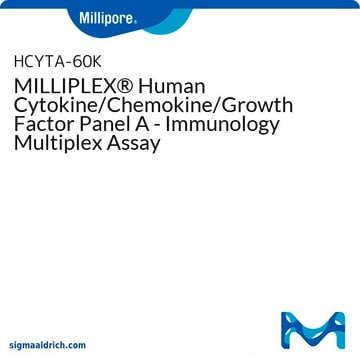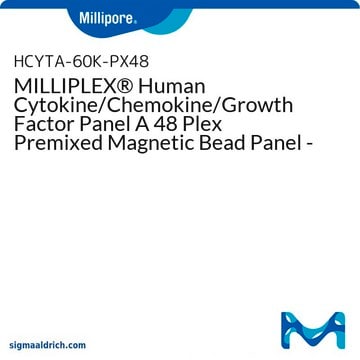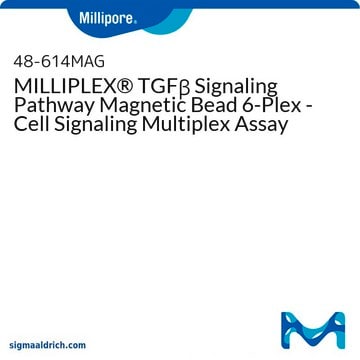TGFBMAG-64K-01
MILLIPLEX® TGFß1 Magnetic Bead Single Plex Kit - Immunology Multiplex Assay
This Immunology Multiplex Assay is used for the simultaneous quantification of the TGF-β1 biomarker in the following species: Mouse/Human/Rat/Pig/Horse/Rabbit/Guinea Pig/Hamster.
Synonym(s):
Luminex® cytokine immunoassay, Millipore TGF beta kit, transforming growth factor beta 1 kit
About This Item
Recommended Products
Quality Level
species reactivity
rat, canine, feline, nonhuman primates, mouse, human, pig
manufacturer/tradename
Milliplex®
assay range
accuracy: 100%
sensitivity: 12 pg/mL
standard curve range: 9.8-2,500 pg/mL
technique(s)
multiplexing: suitable
compatibility
configured for Single Plex
detection method
fluorometric (Luminex xMAP)
shipped in
wet ice
General description
The MILLIPLEX® TGFβ1 Single Plex Magnetic Bead Kit is a single plex kit to be used for the quantification of TGFβ in serum, plasma, tissue/cell lysate and culture supernatant
samples.
The Luminex® xMAP® platform uses a magnetic bead immunoassay format for ideal speed and sensitivity to quantitate multiple analytes simultaneously, dramatically improving productivity while conserving valuable sample volume.
Panel Type: Cytokines/Chemokines
Specificity
Application
- Analyte: TGFβ1
- Recommended Species: In addition to human TGFβ1, the assay can detect TGFβ1 in serum of the following: horse, rabbit, mouse, rat, mini pig, canine, hamster, guinea pig, rhesus monkey and cynomolgus monkey. However, the exact amount of cross reactivity has not been determined.
- Recommended Sample Type: Serum, plasma, cell/tissue culture supernatants and lysates
- NOTE: This assay requires a sample acidification treatment using the provided reagents and protocol.
- Recommended Sample Dilution: 25 μL per well of a 1:30 dilution after acidification treatment of serum and plasma samples; cell/tissue culture samples may require dilution prior to acidification treatment (see protocol for details).
- Assay Run Time: Overnight (16-18 hours) at 2-8°C or alternatively, 2 hours at room temperature (20-25°C).
- Research Category: Inflammation & Immunology
- Research Subcategory: Cardiovascular Disease, Chronic Inflammatory Disease, Immune Disorders, Inflammatory Disease, Rheumatoid Arthritis
Packaging
Storage and Stability
Legal Information
Disclaimer
Signal Word
Danger
Hazard Statements
Precautionary Statements
Hazard Classifications
Acute Tox. 4 Dermal - Aquatic Chronic 2 - Eye Dam. 1 - Met. Corr. 1 - Skin Corr. 1A - Skin Sens. 1
Storage Class Code
8A - Combustible corrosive hazardous materials
Certificates of Analysis (COA)
Search for Certificates of Analysis (COA) by entering the products Lot/Batch Number. Lot and Batch Numbers can be found on a product’s label following the words ‘Lot’ or ‘Batch’.
Already Own This Product?
Find documentation for the products that you have recently purchased in the Document Library.
Related Content
Discover benefits of using biomarker detection multiplex immunoassays for companion and agricultural animal health research and find vet med multiplex assays.
Discover benefits of using biomarker detection multiplex immunoassays for companion and agricultural animal health research and find vet med multiplex assays.
Discover benefits of using biomarker detection multiplex immunoassays for companion and agricultural animal health research and find vet med multiplex assays.
Discover benefits of using biomarker detection multiplex immunoassays for companion and agricultural animal health research and find vet med multiplex assays.
Our team of scientists has experience in all areas of research including Life Science, Material Science, Chemical Synthesis, Chromatography, Analytical and many others.
Contact Technical Service











